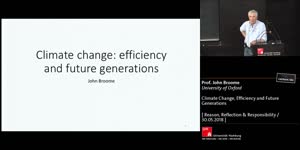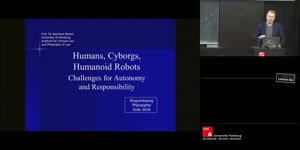Humans, Cyborgs, Humanoid Robots: Challenges for Autonomy and Responsibility - Prof. Dr. Reinhard Merkel - University of Hamburg
- Lecture2Go
- Catalog
- F.5 - Geisteswissenschaften
- Philosophie
- Reason, Reflection & Responsibility
Catalog
Humans, Cyborgs, Humanoid Robots: Challenges for Autonomy and Responsibility
About the Lecture
In the not too distant future, humans will establish close conjunctions with intelligent machines. Their brains will be equipped with technology sufficiently powerful to consign their further cognitive development to the specifications of a technological rather than their biological evolution. They will assimilate to machines. At the same time, progress in robotics, artificial intelligence, neuroscience and engineering will permit the production of intelligent machines that will increasingly adopt functions of independent decision-making within our lifeworld. They will assimilate to human beings. What does this dual convergence mean for conceptions of autonomy and responsibility? And for “autonomy” and “responsibility” of future humanoid robots? Will we have to share these fundamental determinations of human dignity with them? And eventually the power that is associated with it?
About the Speaker
Reinhard Merkel is a emeritus professor in criminal law and philosophy of law at the Universität Hamburg. He has published extensively on neuroethics, bioethics as well as on free will and legal guilt. Merkel is a contributor to national debates on issues such as the Russian annexation of the Crimea and the refugees and migration crisis. He is a member of the German National Academy of Sciences “Leopoldina” and the German Ethics Council.
---
Thinkers in Philosophy & Public Policy
Our precarious times call for a rethinking and renewal of the shared underpinnings of an open, diverse, and inclusive democratic society. To support this process, the Institute of Philosophy is offering a lecture series with leading thinkers who are confronting the challenges and chances that we are facing in all dimensions of life. The idea of this series is to develop a culture of reason, reflection, and responsibility by bringing fundamental global debates to the heart of the campus. The series is about connecting philosophical enquiry to pragmatic action.





